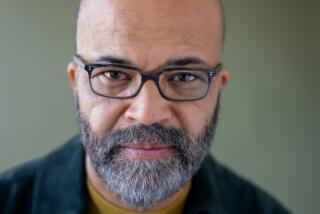Rufus Wainwright takes time to make music on his terms — hallelujah for that

- Share via
Rufus Wainwright feels the clock ticking. He’s only 51, but when his mother died at the age of 63 it made him “keenly aware that you’ve got to do what you can while you’re here,” he says, “because it could end at any time.”
It’s not exactly a morbid mood inside the small, circular library of Wainwright’s home in Laurel Canyon, the October sun shining warmly on the bear rug and floor-to-ceiling books — but the conversation does begin with death. His mother was Kate McGarrigle, the Quebec-born folk singer-songwriter and “the most talented person I ever met,” Wainwright says. “She had this really uncanny ability to just find music in everything.”
But when she died in 2010, there were several unwritten musicals and many unfinished songs.
“I think she always felt limited,” he says, “and just didn’t have the confidence and the support to fulfill her wildest dreams.”
Wainwright is making up for her lost time, in a way, and ensuring he doesn’t lose any of his own. That translates to an incredibly busy schedule of constant touring and performing around the world, and to a prolific output. In addition to his 10 studio albums and two original operas, just this year his first musical, “Opening Night,” debuted in London’s West End, and his “Dream Requiem” for chorus and orchestra premiered in Paris.
This week, he will take audiences through 70 songs from his prodigious catalog across three nights at the Wallis in Beverly Hills. “Rufus-Retro-Wainwright-Spective” will offer a crash course in a critically vaunted musician who has a passionate cult following — including many Hollywood stars — but who has always been a little hard to pin down.
“There are still a lot of people who don’t know my music,” Wainwright says, “but oddly enough a lot of people know my voice — and when I say my voice, I mean my speaking voice.”

Or, he acknowledges, they know him from his iconic cover of Leonard Cohen’s “Hallelujah.” That track has many fans — including, we now know, Donald J. Trump. During the former president’s infamous town-hall-cum-listening-party earlier this month in Oaks, Pa., Trump’s team played Wainwright’s “Hallelujah” in its entirety while the Republican nominee swayed and seemingly listened to every word.
“Great song,” Trump told his faithful, with the giant words “TRUMP WAS RIGHT ABOUT EVERYTHING” looming behind him.
This event occurred a few days after my interview with Wainwright, who immediately issued a public statement and was asked for comment by several news outlets.
“For him to use it was ... blasphemous, in many ways,” the singer told Stephanie Ruhle on MSNBC. But, Wainwright went on, “there were moments when I did also see — because the song is so beautiful and it brings out a kind of humanity — I did see a broken man up there, who needs help, and who is expressing some kind of yearning, maybe, for redemption or something.”
Jamie Lee Curtis — one of Wainwright’s many A-list actress friends — was struck by his ability to mine something hopeful out of this moment of deep fracture and darkness.

“Hearing Rufus articulate so beautifully the grace of the song, in a weird way, wishing that for a man who’s clearly unhinged and saying, ‘Maybe that’s grace for him, and maybe it will help him and heal him a little,’” Curtis says. “I love that Rufus has found himself in the zeitgeist of this collision of culture and politics and humanity and compassion and division.”
Wainwright is accustomed to bringing high culture into, shall we say, less than highbrow arenas; after all, his sublime version of “Hallelujah” originated on the soundtrack for “Shrek.” At the outset of his career in 1998, his unique genre of songwriting was dubbed “popera” by a family friend — and his music does somehow encompass the catchy tune and the irrepressible rhythm of great pop within complex classical chord sequences and a Verdi-sized ambition.
It was only a matter of time before that ambition burst into actual opera; his first, “Prima Donna,” arrived in 2009, followed by “Hadrian” in 2018.
Before the pandemic, Wainwright was approached by the Greek National Opera to compose a work for the 200th anniversary of the Greek revolution of 1821. Through a few left turns, he wound up instead composing a requiem Mass based on the poem “Darkness” by Lord Bryon (who figured in that revolution). The Los Angeles Master Chorale was one of the many commissioning organizations, and Jane Fonda will narrate at the U.S. premiere next May.
Meryl Streep, another friend, narrated the world premiere by the Orchestre Philharmonique de Radio France and choir in June, and the debut was a triumph — “I kind of had the French on their knees, which was amazing,” Wainwright says — which came as a balm after the commercial failure of “Opening Night.” He had always loved the 1977 John Cassavetes film of the same name, and amidst a deep depression a few years ago he had a vision of adapting it into a stage musical.
The result, which starred Sheridan Smith as a woman going through a psychological breakdown, opened in May; it failed to find an audience and closed two months early. Wainwright initially blamed too-conservative British audiences, but today admits that this intimate, dramatic piece was confusingly located in a huge theater between “Cats” and “Fawlty Towers: The Play,” and that it was badly produced.
“So it kind of collapsed at the end, which I think actually gives it a little bit more of a cult quality,” he says, still licking his wounds but looking for the silver lining. His book of 25 original songs was recorded on the final nights, and a cast album is forthcoming.
Finding joy in the darkness seems to be a running theme. That’s what Wainwright did when the pandemic forced everyone into their homes: he began broadcasting daily “Robe Recitals” (a.k.a. “Quarantunes”) on social media; either solo or with a small, masked band, he performed stripped-down versions of his copious songbook — from “Cigarettes and Chocolate Milk” and “Going to a Town” to deep cuts and covers.

He occasionally invited friends to enter the bubble, because “if you do have a little bit of an audience there’s a magic that happens,” he says, “like being in an AA meeting or something.” From the couch in Wainwright’s living room, James Corden sang a duet of “Across the Universe,” and on another day Curtis came over with her husband, Christopher Guest, a lifelong friend of Loudon Wainwright III, Rufus’ father.
“Here I was, wracked with fear and tension,” says Curtis, “and there I was being lifted by the sound of instruments and voices coming together harmonically, spiritually, emotionally. I left better.”
The experience taught Wainwright that many of his songs, which are often elaborately orchestrated, held up well in their most skeletal form. So last year in Paris, he packaged a series of acoustic shows based around themes — “Songs of Youth and Addiction,” “Songs of Love and Desire” and “Songs of Contempt and Resistance ”— interwoven with stories. The Wallis concerts are a reprise of that program.
It’s a second life for a pandemic pick-me-up project — which isn’t all bad memories for Wainwright. He admits feeling a little romantic, even nostalgic, when he thinks back to the quarantine era.
“I miss having the time to really focus on my art and practice my piano,” he says, “and just get lost in that realm.”
He has many more wild dreams — to write a comic opera, to make a French record, possibly to score a film. But first he wants to make one more pop album, possibly his last. For that, Wainwright says he wants “to really burrow into someplace, and take as much time as I can.”
The clock is ticking.
More to Read
The biggest entertainment stories
Get our big stories about Hollywood, film, television, music, arts, culture and more right in your inbox as soon as they publish.
You may occasionally receive promotional content from the Los Angeles Times.










